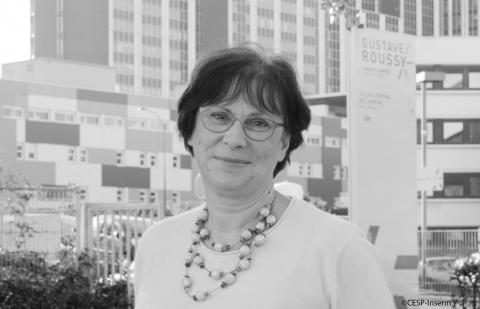
Marie-Christine Boutron-Ruault - A pragmatic approach to human health
Marie-Christine Boutron-Ruault is a research director at the Center for Research in Epidemiology and Population Health (CESP - Inserm/Université Paris Descartes/Université Paris-Sud/Université Versailles - Saint-Quentin-en-Yvelines). A medical practitioner and a dedicated pathophysiologist, she was one of the first in the world to make the connection between certain illnesses and risk factors such as smoking or nutrition. Enriched by her combination of skills, her research is yielding discoveries of great import to our everyday lives.
Marie-Christine Boutron-Ruault had always wanted to combine medicine and research. As a medical student in Dijon, she did multiple in-hospital training and specialised in immunology, pharmacology and epidemiology, ultimately becoming a practitioner of internal medicine with a specialty in gastroenterology. A workaholic, she made the most of each experience, even the hardest. She spent a year working as a rescue squad doctor in Nevers, in the centre of France, before successfully passing her residency exams and being assigned to a hospital in Dijon. Encouraged by her superiors, she took, and eventually passed, the exams to join the French national institute of health and medical research (Inserm).
Cross-disciplinary skills
Two of the department heads at the Hospital of Dijon, Professor François Martin (internal medicine and cancer immunology) and Professor Jean Faivre (gastroenterology), played an influential role early in Marie-Christine Boutron-Ruault's career. Both were aware of her potential and neither wanted to let her get away. She assisted Prof. Faivre, whom she regarded as her mentor, in setting up a registry for cancers of the digestive system and a collaborative international study with a dozen specialized centres in Europe. "He encouraged me to attend international conferences very early in my career. Thanks to him, I also got a grant from the International Agency for Research on Cancer (IARC) to study in London in the late 1980s." Knowing that a research position at the Inserm awaited her upon her return, she made full advantage of her London stay and obtained a Master of Science in epidemiology with flying colours.
Risk factors for chronic diseases
Back in France, Marie-Christine Boutron-Ruault joined the registry for digestive cancers in Burgundy and, five years later, she headed for Paris to join the Inserm research unit specialized in gastroenterology and nutrition at the Hôpital Saint-Lazare. When it closed, she and Serge Hercberg established a research unit run jointly by three French public health and research entities (Inserm/CNAM/INRA). In January 2005, she came to the Center for Research in Epidemiology and Population Health (CESP), where she co-headed, then became director of, a research team that has steadily grown in size and is expected to exceed sixty members by 2020. The team studies how lifestyle, genes and health interrelate. Specializing in cohort studies, they seek to better understand the environmental and genetic risk factors for key chronic diseases.
Cancer and red meat
We have all heard that eating red meat and colorectal cancer are connected, that dietary supplements can have risks and that excess vitamin C can have an impact on breast cancer. These findings are due to Dr. Boutron-Ruault, whose modus operandi is inspired by Aristotle, who believed that body and soul are one. "I've always taken a pragmatic, patophysiological approach, using analysis to understand the mechanisms responsible for the occurrence of diseases in order to prevent them more effectively." Her team is involved in a diabetes project under NutriPerso, a strategic research initiative at Université Paris-Saclay. She is also setting up a "depression and cancer risk" project in collaboration with medical practitioners at the hospital in Kremlin-Bicêtre, south of Paris.
Tackling major social issues
The results of Dr. Boutron-Ruault's research have major repercussions for all of us. She considers that "nutritional epidemiology is a 'must-study' because it sheds light on our health and is valuable in formulating clear prevention messages." While making a point of communicating her findings widely, she only deals with well-chosen journalists, because her purpose is not to “create a buzz" but to "retain people's trust". In the meantime, she delegates a great deal of research to her young colleagues and eagerly awaits the results ("like a box of chocolates under the Christmas tree"). Marie-Christine Boutron-Ruault regularly enjoys such "treats" and is expecting others to arrive in the near future. When the good doctor says she never gets bored, it is not hard to believe!

